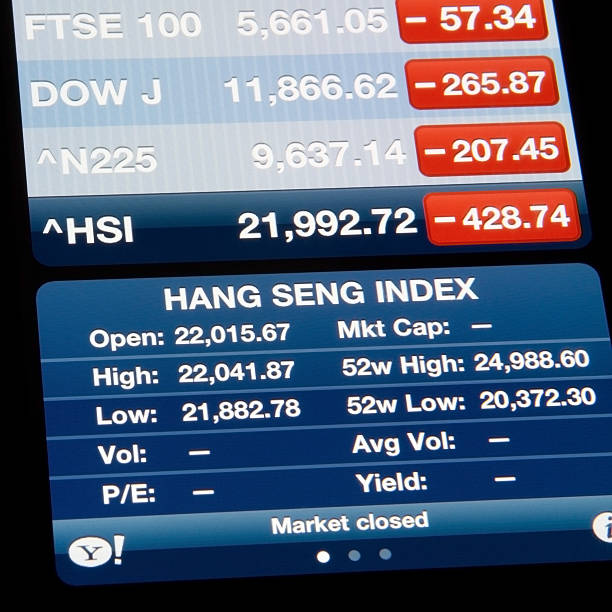The Hang Seng Index (HSI) is a key stock market index in Asia and a major benchmark for Hong Kong Stock Exchange-listed companies. Understanding its role, composition, and influence helps investors evaluate market trends, economic health, and investment opportunities in the Asia-Pacific region, especially concerning the Chinese and Hong Kong economies. This overview delves into the HSI’s origins, composition, importance, and its use as a financial barometer.
Origins and Background of the Hang Seng Index
Introduced in 1969 by Hang Seng Bank, the Hang Seng Stock Market Index captures the performance of top companies on the Hong Kong Stock Exchange. It signifies a milestone in developing Hong Kong’s financial markets, aiding investors in assessing market health.
The HSI is operated by Hang Seng Indexes Company Limited, a subsidiary of Hang Seng Bank. Since its inception, the index has grown in stature, becoming a major reference point for investors worldwide. The The Hang Seng Index reflects the Hong Kong stock market and signifies Hong Kong’s economy and its connections to mainland China.
The Hang Seng Index’s composition and structure
The Hang Seng Index is market capitalization-weighted, with major companies influencing its movements. It comprises top companies on the Hong Kong Stock Exchange to reflect large, liquid stocks.
The HSI currently consists of 50 companies, which are periodically reviewed to ensure representation of the overall market and are divided into the following four major sectors:
Finance: This sector includes banks, insurance companies, and other financial services, which make up a large portion of the index due to Hong Kong’s role as a global financial hub.
Utilities: Representing companies that provide essential services like electricity and water, this sector offers stability to the index.
Properties and Construction: Real estate and infrastructure companies are included because of the high real estate activity and urban development in Hong Kong.
Commerce and Industry: This sector includes a broad range of companies from industries such as telecommunications, retail, and technology, which contribute to Hong Kong’s economy in diverse ways.
Each company’s weight in the index is based on its market capitalization, with a limit placed on any single company to prevent it from disproportionately affecting the index. This balance helps ensure that the HSI remains an accurate reflection of the Hong Kong market as a whole.
Importance of the Hang Seng Index
The Hang Seng Index holds significant importance for several reasons:
Market Barometer: Hong Kong’s stock market health is gauged primarily by the HSI. Changes in the index often reflect broader economic trends and shifts within Hong Kong and, to some extent, mainland China. Investors around the world use the Hang Seng Index to monitor Hong Kong’s economic conditions and assess market sentiment.
International Investment: International investors monitor the HSI to access Chinese and Hong Kong markets and view it as a gauge of China’s economic prowess due to the substantial presence of Chinese firms listed in Hong Kong.
China’s Economic Indicator: Hong Kong Stock Exchange lists Mainland Chinese companies, making the economy of Hong Kong reflected in its market and closely connecting it to China. This makes the index relevant for gauging Chinese economic trends, particularly in sectors like finance, technology, and real estate.
Also Read: HSI Stock Market Index Tools and Resources for Investors
Investment Products: Various financial products like mutual funds, ETFs, and index futures, based on the HSI, enable passive investment in the Hong Kong market. Institutional investors and hedge funds commonly use these products to gain exposure or hedge investments.
Economic Policy Indicator: The Hang Seng Stock Market Index also reflects the impact of policy changes. Shifts in U.S.-China trade, Hong Kong autonomy, and Chinese economic reforms can significantly impact the HSI. Investors closely watch the index to understand the influence of these policies on the market.
How to Use the Hang Seng Index in Investment
Investors can utilize the Hang Seng Index in multiple ways.
Benchmarking Performance:Investors frequently use the HSI as a benchmark to gauge their Hong Kong-based stock investments. Hong Kong or China stock fund managers compare returns against the index to assess strategy success.
Market Sentiment Indicator: By tracking daily, weekly, or monthly changes in the HSI, investors can gauge market sentiment. A rising HSI signals investor confidence in Hong Kong and China, while a declining HSI may suggest market concerns.
Investment and Trading Strategies: Many traders and investors use the Hang Seng Index as part of their broader investment strategies. For instance, trend-following investors may use the index to identify uptrends and downtrends. Additionally, options and futures based on the HSI allow for a range of trading strategies that capitalize on market movements.
Diversification: Investing in HSI tracking products diversifies portfolios with exposure to a wide range of Hong Kong and Chinese companies. This can be particularly valuable for those looking to spread their risk across international markets.
Conclusion
The Hang Seng Stock Market Index is crucial for Hong Kong and global markets, providing insights into Hong Kong’s economy, its ties to mainland China, and assessing market performance for international investors through products like ETFs and futures.Understanding the HSI is vital for investors looking to access Hong Kong’s dynamic market and its strong connections with China.

